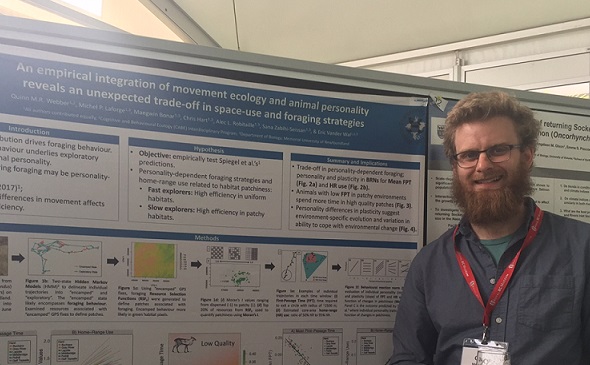I recently attended the Canadian Society of Ecology Evolution (CSEE) conference in Victoria, BC, and as I’ve been reflecting on my experiences at this conference (and others) I thought about sharing them in a blog post.
To start: conferences are hard! Not only do we present our research as oral or poster presentations to experts in our field, we also need to prepare for our presentation/poster ahead of time. In addition to this, once at the conference we are thrown head first into a range of social scenarios with potentially famous scientists/researchers! Okay, so it’s not THAT bad.
Throughout my undergrad, MSc, and PhD I attended and presented at seven international conferences; four North American Society for Bat Research (NASBR) conferences and three CSEE conferences, both of which are wonderful and full of amazing people that help make them a comfortable place for everyone. During my time attending these conferences, I noticed, and would like to highlight, three things that are relevant for graduate students – whether it’s your first, or 15th time attending.
First, graduate students often give the best talks. And by often, I mean almost always! This was always the case at both NASBR and CSEE, and apparently it’s similar at other conferences as well. One hypothesis explaining this phenomenon is that students care more. The rationale is that some professors may have only prepared their talk the night before, while students often focus on their project and presentation for a very long time, so they are more comfortable with the material. Specifically, students are likely presenting an aspect of their thesis which they’ve spent an extended period of time thinking about, writing about, and maybe even presenting about at local or regional conferences. As a result, some of the best talks I’ve seen at conferences were student talks.
Second, one of the harder parts of ‘conferencing’ for me is the socializing aspect. I think at my first conference as an Honours student I clung to a couple of senior lab-members and never left their side! I was terrified to talk to anyone because I didn’t know what to say! As an introvert, conferences can be tough – a topic covered recently in a popular science blog: ‘conferencing as an introvert’ – but of course, there are ways to do it! I have noticed two strategies that work; one helps you immediately and one helps you in the long-run.
The “I’m stuck in a coffee break with no one to talk to” strategy is to find someone right away, and talk to them. Find someone whose presentation you saw (and liked) and tell them you thought it was cool. If this person happens to be a student, they’re probably feeling the same way you are, and are probably relieved you came to talk to them. If it’s a professor or post-doc, they are more than likely willing to engage with you and have a conversation about your research as well. Another option is to ask your supervisor and/or senior lab-mates to introduce you to people they know or people you might want to know. This always works well and takes the pressure off saying “hi” to a stranger. In many ways, meeting people at conferences is almost like speed-dating – an idea that my former and current lab-mates often joke about. Another thing you can do is attend social events. These are organized for a reason and can be quite fun! They’re also an opportunity to interact with other people – maybe while drinking a free adult beverage or two – in a more low-key atmosphere (i.e., at a pub). Some of my best networking experiences occurred at these events and therefore, I always try to attend them.
The long-run strategy is not particularly helpful when you’re at your first conference, but after attending the same conference multiple times you’ll get to know more people. By your third or forth time attending you will have a built-in network of colleagues, friends, and potential future collaborators. This is something I’ve noticed and I really appreciate. At the first NASBR conference I attended I only knew the people in my own lab and I met a few new people. The next year, I knew my lab plus the people from the previous year, and I met a few more new people. And, so it goes. If you are starting a PhD, or even a Master’s degree, and you know what conference is best suited for you, it would be worthwhile to start going right away because the earlier you attend, the greater your network opportunities might be further down the road.
My advice to any graduate students attending their first conference is to make sure you present something you are comfortable with (such as a thesis chapter that’s nearly done). Make sure you prepare – as mentioned, I think the reason students often give better talks than professors, is that we care and we prepare. Finally, make sure you engage with other conference attendees. While conferences can be stressful, and preparing for them can be a lot of work, they are an important aspect of being a graduate student and they, of course, can be a lot of fun!
Until next time…
~Quinn https://zp-pdl.com/get-quick-online-payday-loan-now.php https://zp-pdl.com/emergency-payday-loans.php
